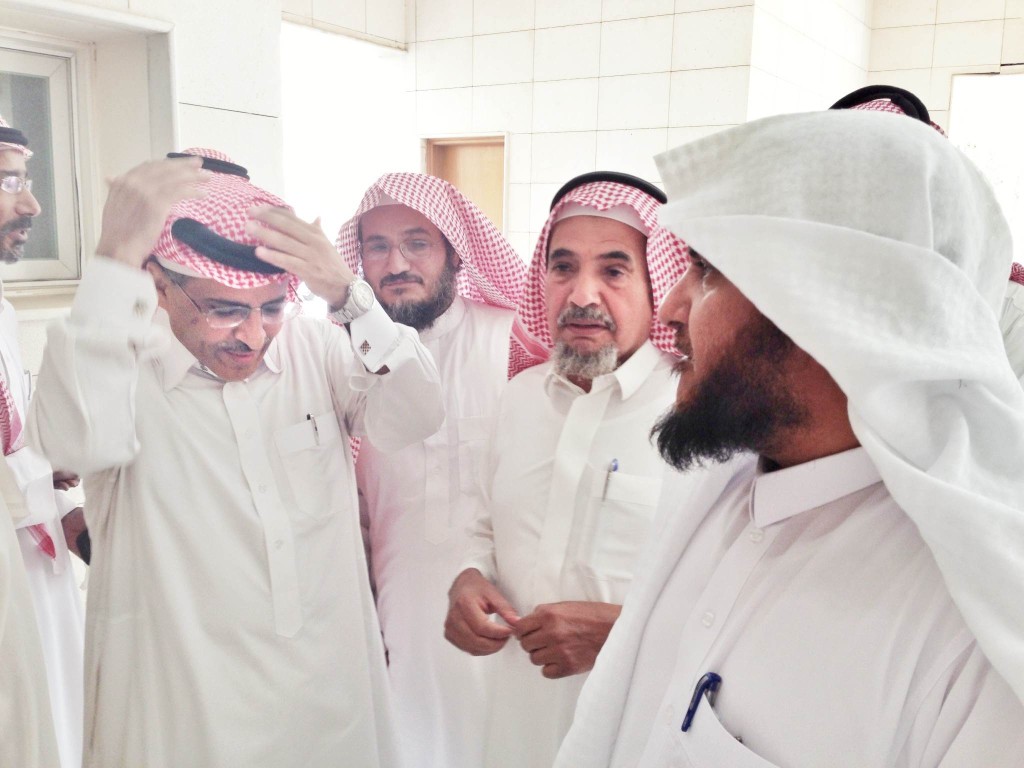إضغط هنا لنسخة عربية
20 October 2015 – Washington, DC – Yesterday, Saudi Arabia’s Specialized Criminal Court (SCC) sentenced human rights defender and scholar of Islamic law Dr. Abdulkareem al-Khoder to 10 years in prison and a further 10-year travel ban. Dr. al-Khoder is a founding member of the Saudi Arabian Civil and Political Rights Association (ACPRA), a human rights and reformist group that the Kingdom of Saudi Arabia has subjected to systematic repression. Dr. al-Khoder’s conviction follows the recent sentencing of ACPRA founding member and former organization president Dr. Abdulrahman al-Hamid to 9 years in prison, a 9-year travel ban, and a further SR 50,000 (USD 13,330) fine. Americans for Democracy & Human Rights in Bahrain (ADHRB) strongly condemns the sentencing of both Dr. al-Khoder and Dr. al-Hamid and calls on King Salman bin Abdulaziz Al Saud to commute their sentences and secure their release.
As has occurred with increasing frequency to other Saudi human rights defenders and nonviolent political dissidents, significant due process violations and jurisprudential irregularities marred the cases of Dr. al-Khoder and Dr. al-Hamid. In April 2013, while already on trial before the criminal court in Buraidah for charges related to his ACPRA activity (including “inciting disorder by calling for demonstrations” and “participating in the founding of an unlicensed organization”), authorities arrested Dr. al-Khoder after he protested the closing of his trial to female observers. In June 2013, the court sentenced him to eight years in prison. After an appeals court rejected his initial sentence, authorities forwarded his case to the SCC, Saudi Arabia’s anti-terrorism tribunal. Though the summary court ordered his release pending re-sentencing, authorities held him in arbitrary detention for the duration of his second trial.
Authorities arrested Dr. al-Hamid, an Islamic economics scholar and brother of fellow ACPRA members Abdullah and Isa al-Hamid, in April 2014 after he signed a statement condemning the systematic repression of the Saudi Ministry of Interior (MOI). Authorities held him incommunicado during his interrogation and did not permit him to contact family members until he embarked upon a hunger strike. As late as 30 January 2015, over ten months after his initial arrest, the government had not publicly released the charges against him. Last week, the SCC convicted him of establishing an unlicensed organization, questioning the independence of the judiciary, and disobeying the ruler, among other charges.
“Over the past several years, we have seen reformers in Saudi Arabia suffer the same due process violations that they risked their lives and livelihoods to end,” said James Suzano, ADHRB’s acting director of advocacy and legal affairs. “Not only did authorities wrongfully detain Doctors al-Khoder and al-Hamid on charges related to their peaceful human rights activity, but they also subjected Dr. al-Khoder to double jeopardy, and Dr. al-Hamid to lengthy and arbitrary pre-trial detention.”
Dr. al-Khoder and Dr. al-Hamid, alongside nine other legal scholars, academics, and businessmen, founded ACPRA in 2009. The organization pursued a dual mission of advocating for governing reforms, including the establishment of a constitutional monarchy and an independent judiciary, and of documenting severe human rights abuses committed by government agencies. Since March 2011, the kingdom has sought to close the organization through the systematic arrest, prosecution, and imprisonment of its members. As of today, nine ACPRA cofounders have been sentenced to lengthy prison terms, the majority by the SCC. The two remaining cofounders, Abdulaziz al-Shubaili and current president Isa al-Hamid, are at liberty but reaching the ends of their respective trials before the SCC. It is likely that they will receive lengthy prison sentences in the coming weeks or months.
“With these rulings, the Saudi government silences a group that transcended social divisions and consistently advocated for peaceful change, even as they asked for far-reaching reforms,” said ADHRB Executive Director Husain Abdulla. “Both the Saudi authorities and the international community are well aware that the kingdom will not reach its stated benchmarks for reform unless ACPRA’s members are free and working for change within civil society.”
ADHRB calls on the Kingdom of Saudi Arabia to immediately reverse these rulings and release Dr. al-Khoder, Dr. al-Hamid, and their fellow imprisoned association members. It also calls on the Ministry of Interior to drop the charges against ACPRA’s remaining members.





